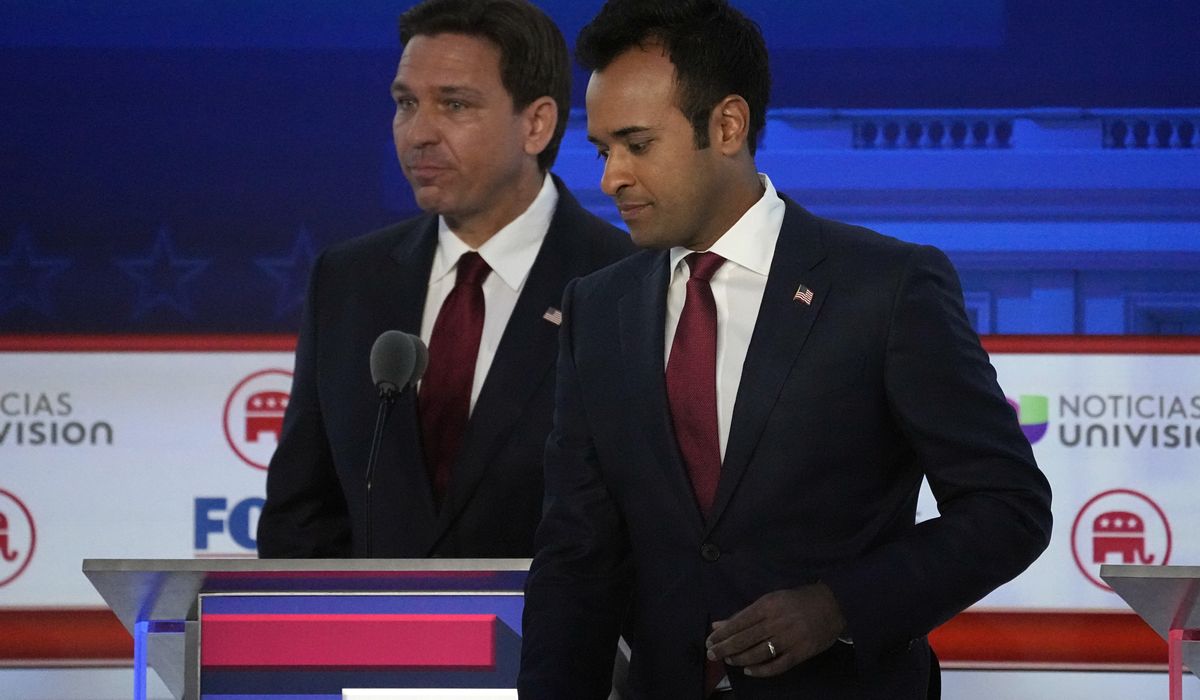


Vivek Ramaswamy is vowing to close the FBI, IRS and the Nuclear Regulatory Commission.
Gov. Ron DeSantis of Florida adds the IRS and the departments of Commerce and Energy to his list of unnecessary government bureaucracies that need to be permanently closed.
Former Vice President Mike Pence wants to shutter the Environmental Protection Agency as part of his push to revive federalism.
And former President Donald Trump has joined his rivals in the 2024 GOP presidential race who promise to abolish the Department of Education.
The 2024 Republican presidential contenders are espousing ways to not only starve the federal beast but sever its limbs.
“Americans believe the U.S. government is riddled with waste and fraud so it is easy for candidates to say they will abolish certain departments as a way to cope with governmental dysfunction,” said Darrel M. West, vice president of the Governance Studies program at the Brookings Institution. “A number of voters think the country would save money from the elimination of wasteful spending.”
Mr. Ramaswamy, a biotech millionaire, has been the most aggressive in targeting “three-letter agencies” and the “unelected bureaucrats” that run them.
He is promising to close the FBI, fire many of its employees and send the rest of the workforce into the US Marshalls and the Drug Enforcement Agency. The Bureau of Alcohol, Tobacco, Firearms and Explosives also is on the chopping block along with the Nuclear Regulatory Commission.
Mr. Ramaswamy again envisions moving some of those employees into other federal agencies that “have not yet been corrupted.”
“We will once again get in there and shut it down,” Mr. Ramaswamy said recently. “That is how to revive the integrity of a Constitutional Republic. … Do we want incremental reform, or do we want revolution?”
Mr. DeSantis, meanwhile, has said he would do away with the IRS, Department of Commerce and Department of Energy.
“So if Congress will work with me on doing that, we’ll be able to reduce the size and scope of government,” Mr. DeSantis said.
If Congress refused to go that far, Mr. DeSantis said he would use those same federal agencies “to push back against woke ideology and against the leftism that we see creeping into all institutions of American life.”
Critics say the big promises are far-fetched and will go unfulfilled.
“Critics, skeptics and supporters alike can visit Vivek2024.com/ShutItDown where they can review the unprecedented specificity in which Vivek lays out the practical and legal basis for shutting down the administrative deep state,” said Ramaswamy spokesperson Tricia McLaughlin.
The Department of Education has been the most popular target.
Mr. Trump put his imprint on the debate last month when he aired a video in which he pledged to “end education coming out of Washington, D.C.”
We are going to close it up — all those buildings all over the place and you have people that in many cases hate our children,” he said. “We are going to send it all back to the states.”
Small government conservatives have been clamoring to shutter the Department of Education since President Carter created it in 1979 by combining offices from several federal agencies.
President Reagan pledged to scrap it on his way to winning the White House in 1980. He ditched the idea after Secretary of Education Terrel H. Bell issued a report about the nation’s failing education system.
Former House Speaker Newt Gingrich advocated for it in the 1994 “Contract with America.” Bob Dole ran on it in 1996.
In 2011, the shut-it-down plan produced Rick Perry’s cringe-worthy “Oops” at a GOP presidential debate when he vowed to eliminate three cabinet departments but could only remember two of them: Education and Commerce.
Frederick M. Hess, the senior fellow at the American Enterprise Insitute, a conservative think tank, said it is easy for candidates to pledge to eliminate the Department of Education, but harder to spell out their plans for doing so.
Part of the problem is the lion’s share of the department’s money goes toward popular programs such as student loans, Pell Grants, and services for children with special needs and poor K-12 students.
“I think the real frustration for folks who are serious about trying to tackle these issues is there is nothing wrong with saying you want to abolish the Department of Education if it is part of a concrete, coherent, vision of how you get Uncle Sam under control,” Mr. Hess said. “The frustration you hear is that it has often served as a talking point, in order to avoid having to talk about any of the hard stuff, or think through how you actually rein in an out-of-control department.”
Mr. Hess said Mr. Trump was well-positioned to target the Department of Education when he took office in 2019 with a GOP-controlled Congress, but it did not happen.
• Seth McLaughlin can be reached at smclaughlin@washingtontimes.com.
